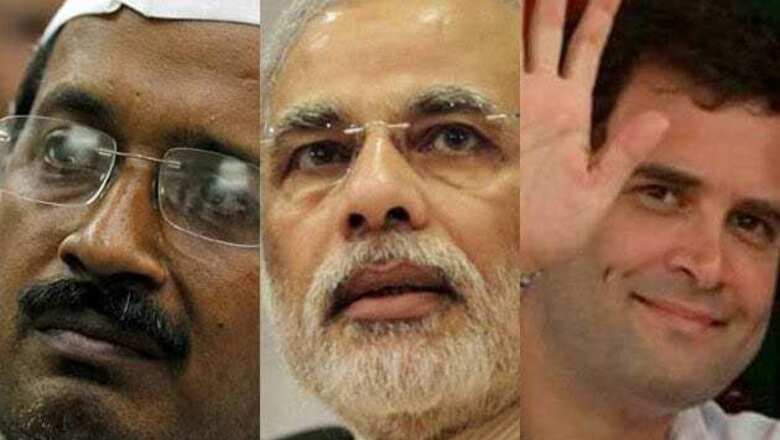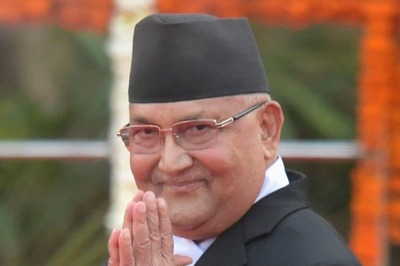
views
The high-decibel election campaign to elect the prime minister of the world's largest democracy came to an end on Monday. While the Election Commission battles allegations and counter-allegations over how 'fair' these elections were, it turns out that there is an external threat to these polls. According to a US based research agency, voting patterns are determined by internet search results! That's right, what you read on the internet has a huge impact on the EVM button that you press. Going by the agency's findings the results of these searches can determine who holds the edge between star candidates like Narendra Modi and Arvind Kejriwal- two of the most 'searched for' politicians during these elections.
According to an experiment-based study conducted by the American Institute for Behavioral Research and Technology, Google (which has a monopoly on search engines in India) has the power to fix the Lok Sabha elections without anyone being the wiser.
Search engine's role in shaping people's opinions
The study conducted by the California-based institute suggests that the higher the rank, the more people trust the results.
Hence, a particular highly-ranked search result could make Arvind Kejriwal look better than Narendra Modi.
This is possible because of the role that search rankings play in shaping people's opinions in deciding the fate of their public representatives in India.
What's the study?
The study shows the enormous power that biased search rankings have to alter the voting preferences of undecided voters.
In the study, the US-based researchers from some of the top-notch institutions deliberately manipulated the voting preferences of some of the undecided voters in the Lok Sabha elections.
About 2,000 persons from 26 of the 28 Indian states participated in the study. The participants were randomly assigned to groups in which search rankings favoured either AAP leader Arvind Kejriwal, Congress Vice-President Rahul Gandhi or BJP's PM nominee Narendra Modi.
The researchers have shown that votes in India can easily be pushed toward one candidate or another by about 12 per cent - double that in some demographic groups - which is good enough to determine the outcomes of many close poll races.
Real search rankings and web pages were used, and people were asked to research all the candidates just as they would on Google. The only difference between the groups was the order in which the search results were displayed.
The study suggests that the biased search rankings have the power to fix the outcome of electoral battle in the Lok Sabha elections in which the winner is projected to win by a margin of 3 per cent or less. This can be done just by influencing undecided voters who use the internet (a small but important group of voters that is sure to grow in coming years).
Worldwide, the US-based researchers say, more than 25 per cent of the national elections are won by margins under 3 per cent.
Modi vs Kejriwal vs Rahul Gandhi
The candidate-specific statistics shows how voting preferences were altered for each candidate by exposure to biased search rankings.
-When people were presented with the search rankings favouring Rahul Gandhi, the number of people voting for him increased by 24.8 per cent.
-When people were presented with search rankings favouring Arvind Kejriwal, the number of people voting for him increased by 11.8 per cent.
-When people were presented with search rankings favouring Narendra Modi, the number of people voting for him increased by 8.3 per cent.
Google monopoly on Indian search engines - a threat to democracy
"This is a very serious matter - a real threat to democracy,' says Dr Robert Epstein, lead researcher in the study and senior research psychologist at the American Institute for Behavioral Research and Technology in Vista, California.
“If two candidates were both trying to push their rankings higher, they would be competing, and that's fine. But if Google, which has a monopoly on search in India, were to favor one candidate, it could easily put that candidate in office by manipulating search rankings, and no one could counter what they were doing," Dr Epstein added.
CEO of Google can choose winners in Lok Sabha elections?
"I know from my research that Google has the power to fix close elections quite easily by manipulating search rankings. I don't know for sure whether Google is exercising this power, but without strict regulation and monitoring, there is nothing to stop them. This is extremely dangerous. If Google were exercising its power to manipulate elections, that would make democracy meaningless. It would give one man - the CEO of Google - the power to choose the winners in democratic elections around the world," Dr Robert Epstein told News18 in an e-mail conversation.



















Comments
0 comment